Consumer Ethics and Ethical Sourcing: A Literature Review
VerifiedAdded on 2022/08/20
|14
|2732
|11
Literature Review
AI Summary
This literature review examines the complex relationship between ethical sourcing and consumer behavior. The paper investigates two key research questions: whether consumers actively seek ethical products and if they would forgo substitutes, and how purchasing behaviors influence the promotion and sourcing of ethical goods. The review synthesizes findings from various sources, including Proquest, analyzing how factors like ethical claims, social identity, and environmental consciousness affect consumer decisions. The analysis highlights that a significant percentage of consumers are willing to boycott unethical brands and purchase products with social or environmental benefits, indicating a growing demand for ethical products. The review also covers the impact of ethical sourcing on various product categories like apparel and food, showing how consumer perceptions and moral intensity influence purchasing behavior. The review concludes that ethical considerations are increasingly important to consumers, influencing their purchasing decisions and brand loyalty, and thereby shaping the ethical sourcing practices of businesses.
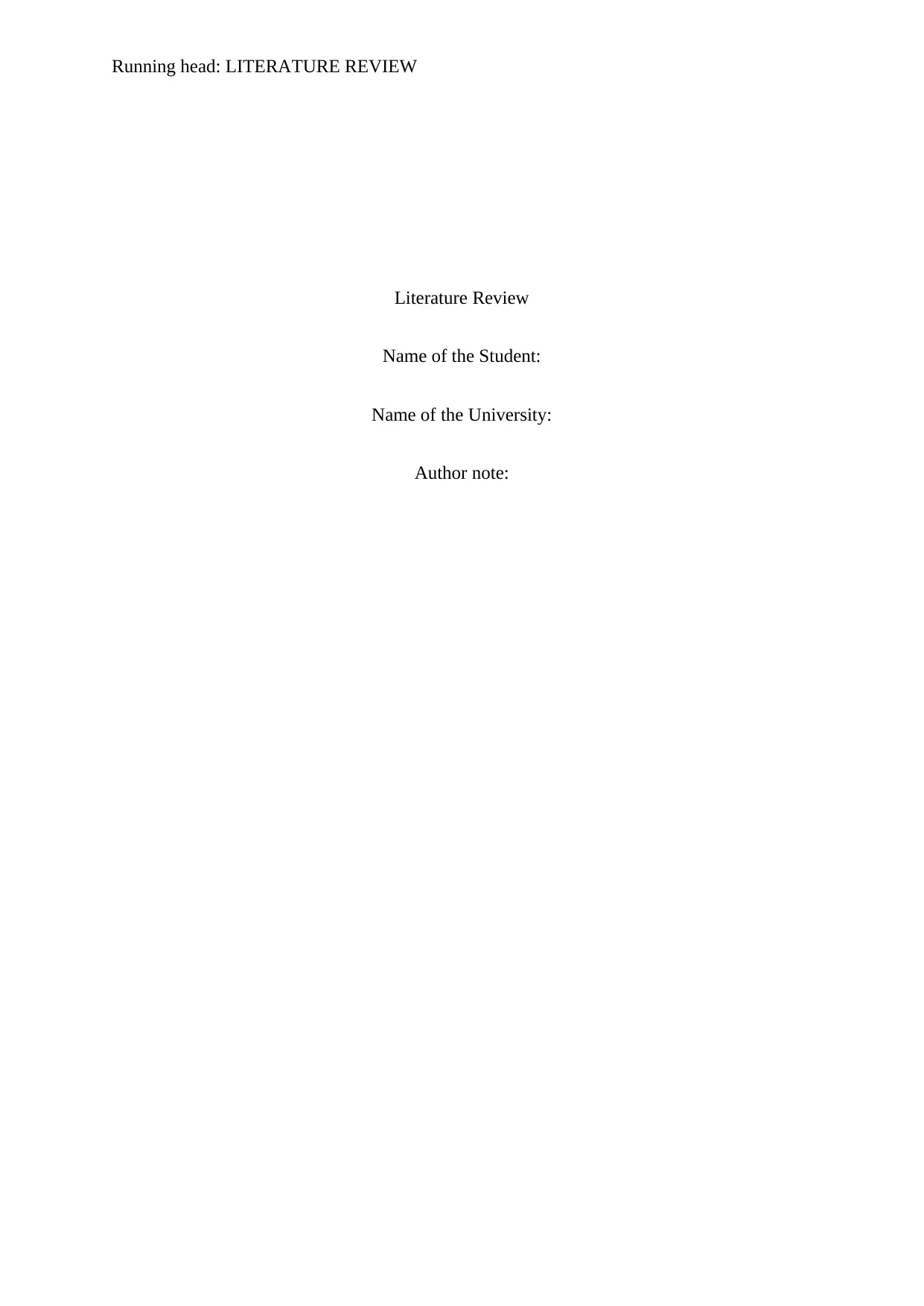
Running head: LITERATURE REVIEW
Literature Review
Name of the Student:
Name of the University:
Author note:
Literature Review
Name of the Student:
Name of the University:
Author note:
Paraphrase This Document
Need a fresh take? Get an instant paraphrase of this document with our AI Paraphraser

1LITERATURE REVIEW
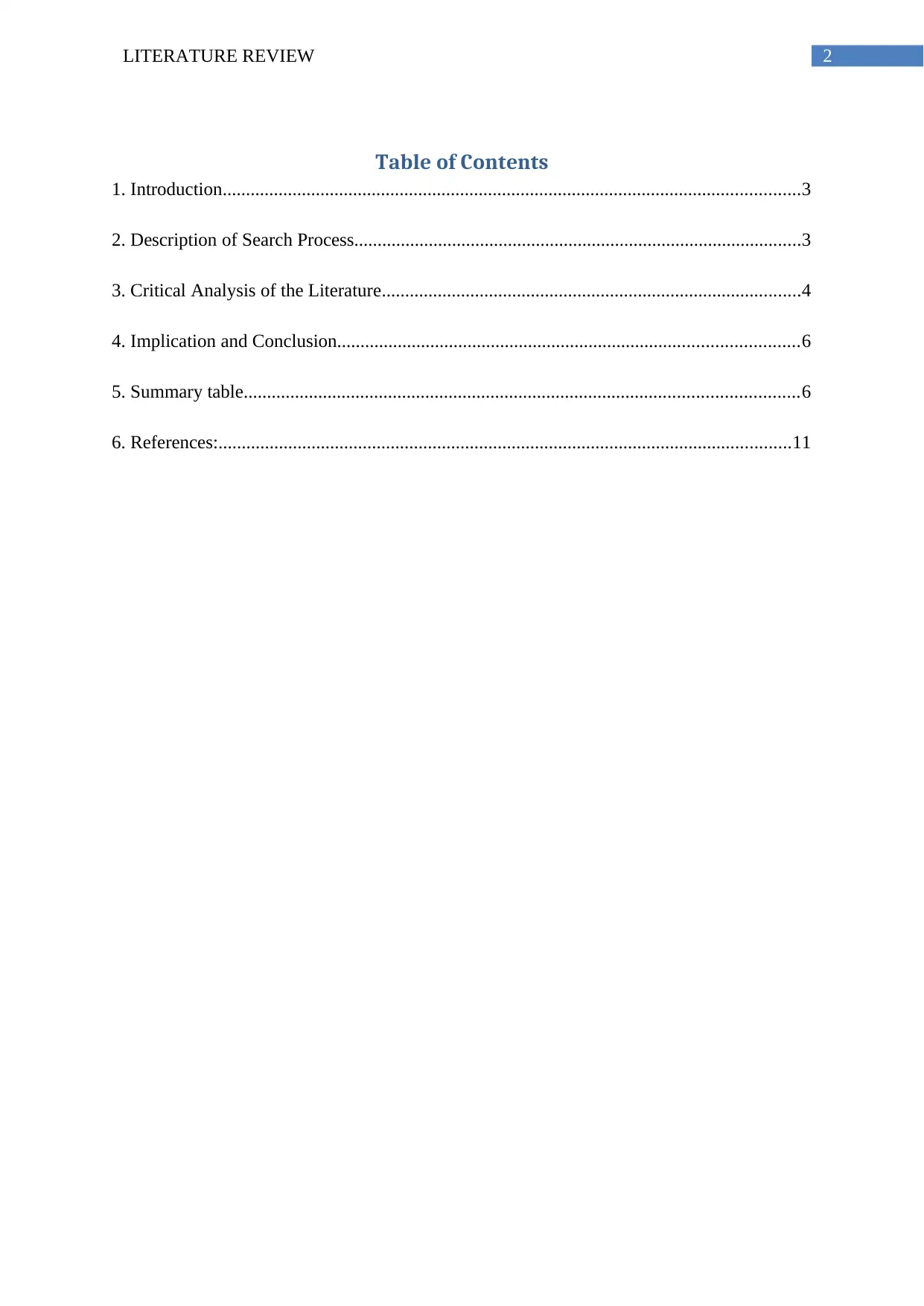
2LITERATURE REVIEW
Table of Contents
1. Introduction............................................................................................................................3
2. Description of Search Process................................................................................................3
3. Critical Analysis of the Literature..........................................................................................4
4. Implication and Conclusion...................................................................................................6
5. Summary table.......................................................................................................................6
6. References:...........................................................................................................................11
Table of Contents
1. Introduction............................................................................................................................3
2. Description of Search Process................................................................................................3
3. Critical Analysis of the Literature..........................................................................................4
4. Implication and Conclusion...................................................................................................6
5. Summary table.......................................................................................................................6
6. References:...........................................................................................................................11
⊘ This is a preview!⊘
Do you want full access?
Subscribe today to unlock all pages.

Trusted by 1+ million students worldwide
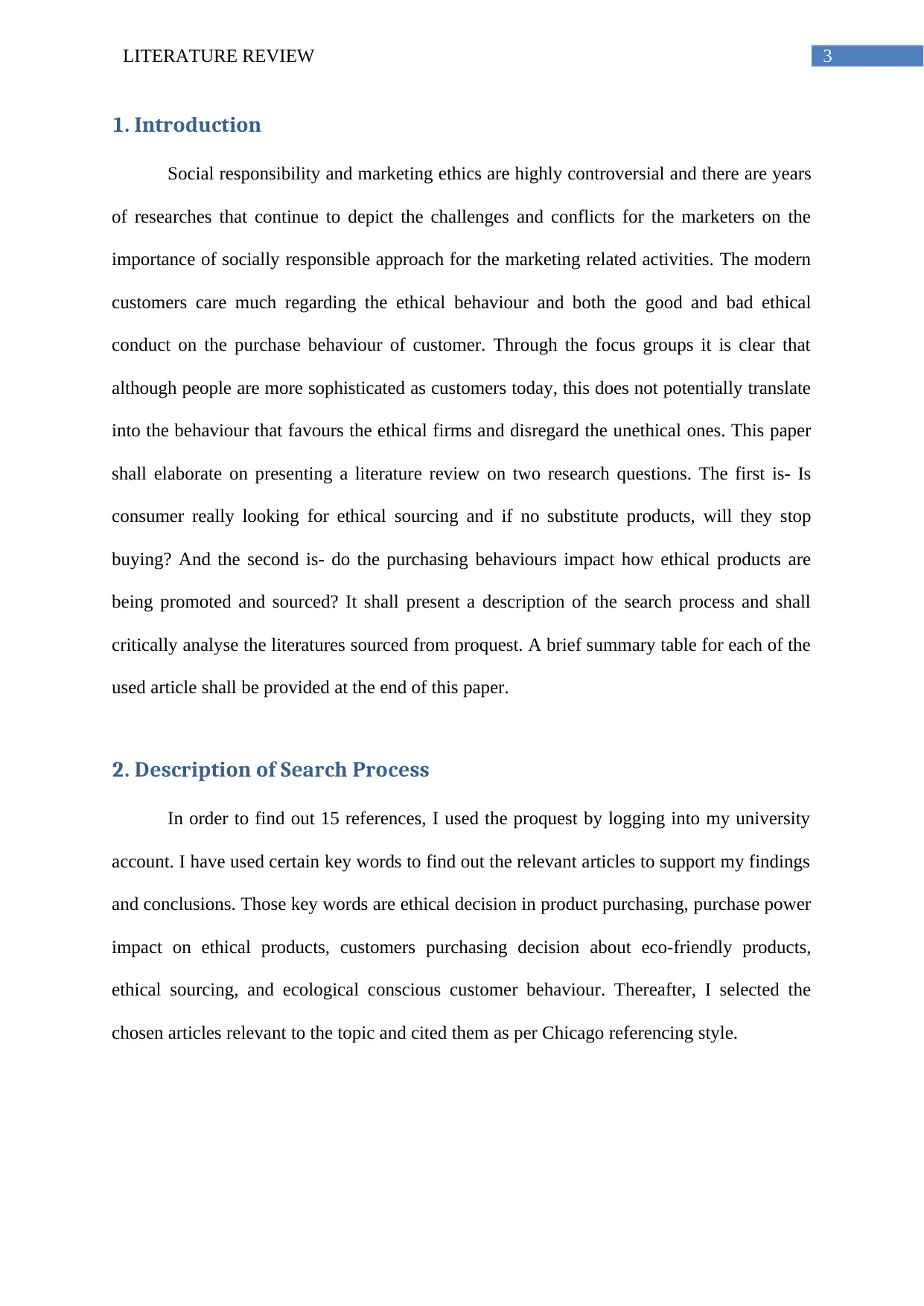
3LITERATURE REVIEW
1. Introduction
Social responsibility and marketing ethics are highly controversial and there are years
of researches that continue to depict the challenges and conflicts for the marketers on the
importance of socially responsible approach for the marketing related activities. The modern
customers care much regarding the ethical behaviour and both the good and bad ethical
conduct on the purchase behaviour of customer. Through the focus groups it is clear that
although people are more sophisticated as customers today, this does not potentially translate
into the behaviour that favours the ethical firms and disregard the unethical ones. This paper
shall elaborate on presenting a literature review on two research questions. The first is- Is
consumer really looking for ethical sourcing and if no substitute products, will they stop
buying? And the second is- do the purchasing behaviours impact how ethical products are
being promoted and sourced? It shall present a description of the search process and shall
critically analyse the literatures sourced from proquest. A brief summary table for each of the
used article shall be provided at the end of this paper.
2. Description of Search Process
In order to find out 15 references, I used the proquest by logging into my university
account. I have used certain key words to find out the relevant articles to support my findings
and conclusions. Those key words are ethical decision in product purchasing, purchase power
impact on ethical products, customers purchasing decision about eco-friendly products,
ethical sourcing, and ecological conscious customer behaviour. Thereafter, I selected the
chosen articles relevant to the topic and cited them as per Chicago referencing style.
1. Introduction
Social responsibility and marketing ethics are highly controversial and there are years
of researches that continue to depict the challenges and conflicts for the marketers on the
importance of socially responsible approach for the marketing related activities. The modern
customers care much regarding the ethical behaviour and both the good and bad ethical
conduct on the purchase behaviour of customer. Through the focus groups it is clear that
although people are more sophisticated as customers today, this does not potentially translate
into the behaviour that favours the ethical firms and disregard the unethical ones. This paper
shall elaborate on presenting a literature review on two research questions. The first is- Is
consumer really looking for ethical sourcing and if no substitute products, will they stop
buying? And the second is- do the purchasing behaviours impact how ethical products are
being promoted and sourced? It shall present a description of the search process and shall
critically analyse the literatures sourced from proquest. A brief summary table for each of the
used article shall be provided at the end of this paper.
2. Description of Search Process
In order to find out 15 references, I used the proquest by logging into my university
account. I have used certain key words to find out the relevant articles to support my findings
and conclusions. Those key words are ethical decision in product purchasing, purchase power
impact on ethical products, customers purchasing decision about eco-friendly products,
ethical sourcing, and ecological conscious customer behaviour. Thereafter, I selected the
chosen articles relevant to the topic and cited them as per Chicago referencing style.
Paraphrase This Document
Need a fresh take? Get an instant paraphrase of this document with our AI Paraphraser
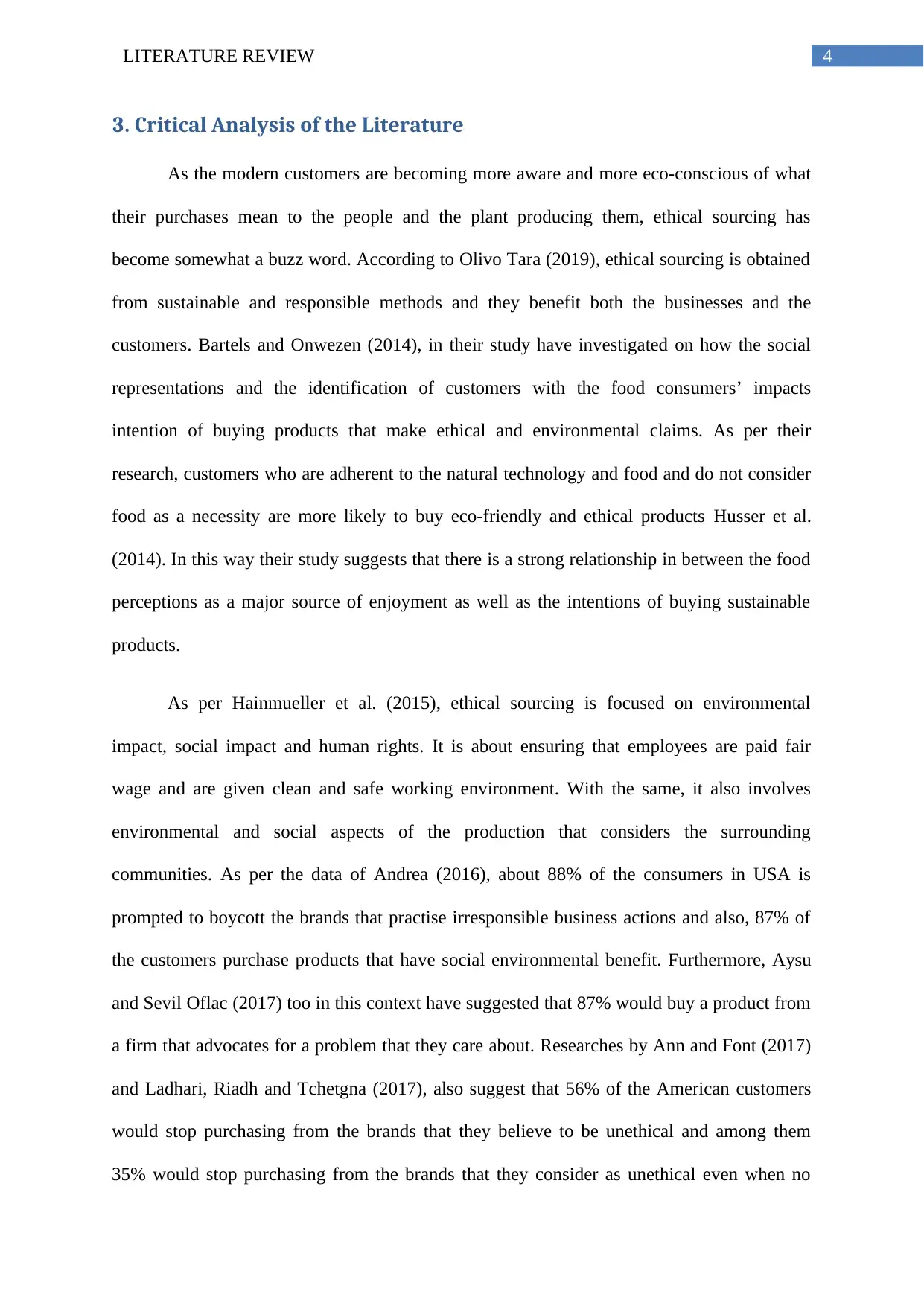
4LITERATURE REVIEW
3. Critical Analysis of the Literature
As the modern customers are becoming more aware and more eco-conscious of what
their purchases mean to the people and the plant producing them, ethical sourcing has
become somewhat a buzz word. According to Olivo Tara (2019), ethical sourcing is obtained
from sustainable and responsible methods and they benefit both the businesses and the
customers. Bartels and Onwezen (2014), in their study have investigated on how the social
representations and the identification of customers with the food consumers’ impacts
intention of buying products that make ethical and environmental claims. As per their
research, customers who are adherent to the natural technology and food and do not consider
food as a necessity are more likely to buy eco-friendly and ethical products Husser et al.
(2014). In this way their study suggests that there is a strong relationship in between the food
perceptions as a major source of enjoyment as well as the intentions of buying sustainable
products.
As per Hainmueller et al. (2015), ethical sourcing is focused on environmental
impact, social impact and human rights. It is about ensuring that employees are paid fair
wage and are given clean and safe working environment. With the same, it also involves
environmental and social aspects of the production that considers the surrounding
communities. As per the data of Andrea (2016), about 88% of the consumers in USA is
prompted to boycott the brands that practise irresponsible business actions and also, 87% of
the customers purchase products that have social environmental benefit. Furthermore, Aysu
and Sevil Oflac (2017) too in this context have suggested that 87% would buy a product from
a firm that advocates for a problem that they care about. Researches by Ann and Font (2017)
and Ladhari, Riadh and Tchetgna (2017), also suggest that 56% of the American customers
would stop purchasing from the brands that they believe to be unethical and among them
35% would stop purchasing from the brands that they consider as unethical even when no
3. Critical Analysis of the Literature
As the modern customers are becoming more aware and more eco-conscious of what
their purchases mean to the people and the plant producing them, ethical sourcing has
become somewhat a buzz word. According to Olivo Tara (2019), ethical sourcing is obtained
from sustainable and responsible methods and they benefit both the businesses and the
customers. Bartels and Onwezen (2014), in their study have investigated on how the social
representations and the identification of customers with the food consumers’ impacts
intention of buying products that make ethical and environmental claims. As per their
research, customers who are adherent to the natural technology and food and do not consider
food as a necessity are more likely to buy eco-friendly and ethical products Husser et al.
(2014). In this way their study suggests that there is a strong relationship in between the food
perceptions as a major source of enjoyment as well as the intentions of buying sustainable
products.
As per Hainmueller et al. (2015), ethical sourcing is focused on environmental
impact, social impact and human rights. It is about ensuring that employees are paid fair
wage and are given clean and safe working environment. With the same, it also involves
environmental and social aspects of the production that considers the surrounding
communities. As per the data of Andrea (2016), about 88% of the consumers in USA is
prompted to boycott the brands that practise irresponsible business actions and also, 87% of
the customers purchase products that have social environmental benefit. Furthermore, Aysu
and Sevil Oflac (2017) too in this context have suggested that 87% would buy a product from
a firm that advocates for a problem that they care about. Researches by Ann and Font (2017)
and Ladhari, Riadh and Tchetgna (2017), also suggest that 56% of the American customers
would stop purchasing from the brands that they believe to be unethical and among them
35% would stop purchasing from the brands that they consider as unethical even when no
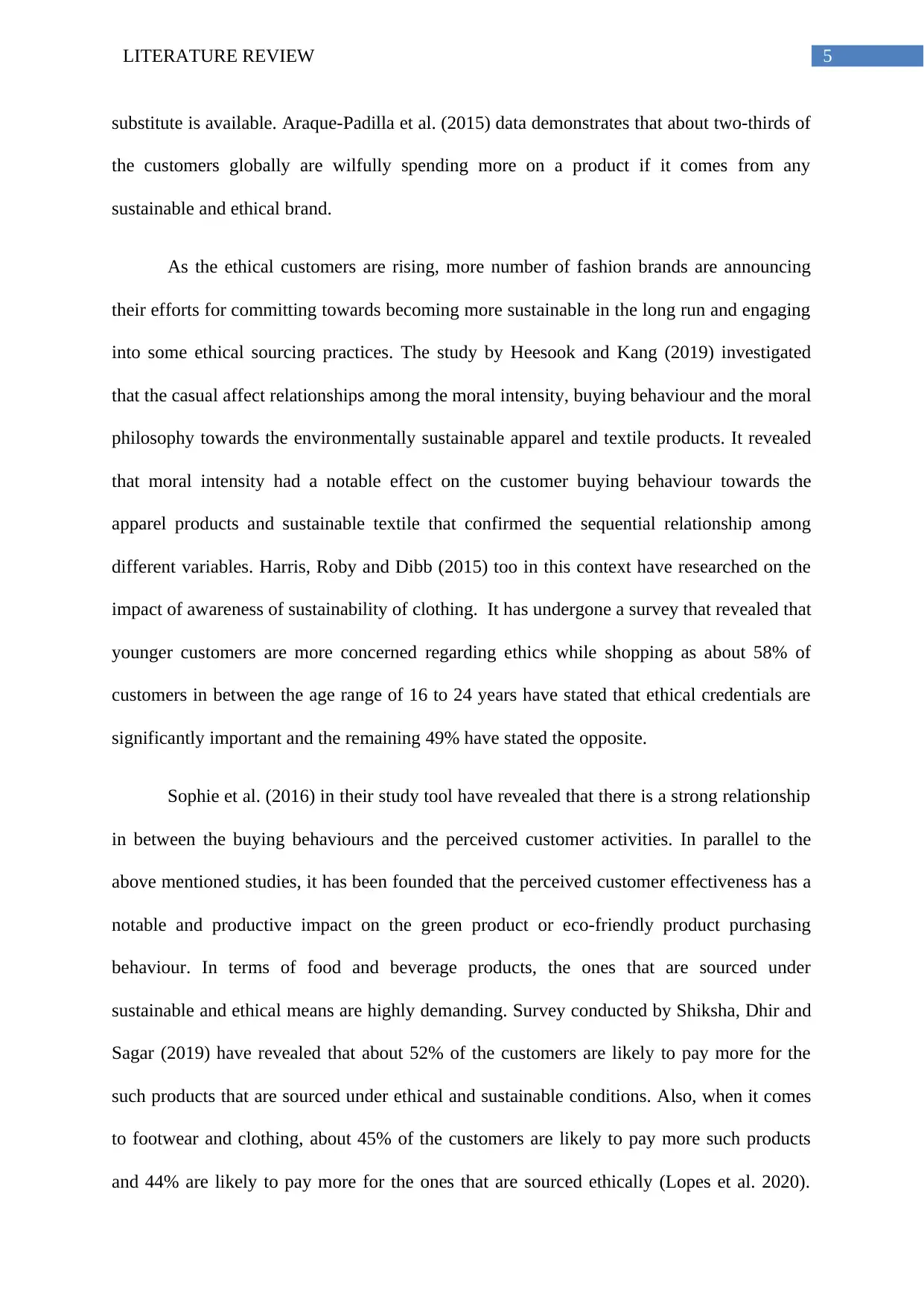
5LITERATURE REVIEW
substitute is available. Araque-Padilla et al. (2015) data demonstrates that about two-thirds of
the customers globally are wilfully spending more on a product if it comes from any
sustainable and ethical brand.
As the ethical customers are rising, more number of fashion brands are announcing
their efforts for committing towards becoming more sustainable in the long run and engaging
into some ethical sourcing practices. The study by Heesook and Kang (2019) investigated
that the casual affect relationships among the moral intensity, buying behaviour and the moral
philosophy towards the environmentally sustainable apparel and textile products. It revealed
that moral intensity had a notable effect on the customer buying behaviour towards the
apparel products and sustainable textile that confirmed the sequential relationship among
different variables. Harris, Roby and Dibb (2015) too in this context have researched on the
impact of awareness of sustainability of clothing. It has undergone a survey that revealed that
younger customers are more concerned regarding ethics while shopping as about 58% of
customers in between the age range of 16 to 24 years have stated that ethical credentials are
significantly important and the remaining 49% have stated the opposite.
Sophie et al. (2016) in their study tool have revealed that there is a strong relationship
in between the buying behaviours and the perceived customer activities. In parallel to the
above mentioned studies, it has been founded that the perceived customer effectiveness has a
notable and productive impact on the green product or eco-friendly product purchasing
behaviour. In terms of food and beverage products, the ones that are sourced under
sustainable and ethical means are highly demanding. Survey conducted by Shiksha, Dhir and
Sagar (2019) have revealed that about 52% of the customers are likely to pay more for the
such products that are sourced under ethical and sustainable conditions. Also, when it comes
to footwear and clothing, about 45% of the customers are likely to pay more such products
and 44% are likely to pay more for the ones that are sourced ethically (Lopes et al. 2020).
substitute is available. Araque-Padilla et al. (2015) data demonstrates that about two-thirds of
the customers globally are wilfully spending more on a product if it comes from any
sustainable and ethical brand.
As the ethical customers are rising, more number of fashion brands are announcing
their efforts for committing towards becoming more sustainable in the long run and engaging
into some ethical sourcing practices. The study by Heesook and Kang (2019) investigated
that the casual affect relationships among the moral intensity, buying behaviour and the moral
philosophy towards the environmentally sustainable apparel and textile products. It revealed
that moral intensity had a notable effect on the customer buying behaviour towards the
apparel products and sustainable textile that confirmed the sequential relationship among
different variables. Harris, Roby and Dibb (2015) too in this context have researched on the
impact of awareness of sustainability of clothing. It has undergone a survey that revealed that
younger customers are more concerned regarding ethics while shopping as about 58% of
customers in between the age range of 16 to 24 years have stated that ethical credentials are
significantly important and the remaining 49% have stated the opposite.
Sophie et al. (2016) in their study tool have revealed that there is a strong relationship
in between the buying behaviours and the perceived customer activities. In parallel to the
above mentioned studies, it has been founded that the perceived customer effectiveness has a
notable and productive impact on the green product or eco-friendly product purchasing
behaviour. In terms of food and beverage products, the ones that are sourced under
sustainable and ethical means are highly demanding. Survey conducted by Shiksha, Dhir and
Sagar (2019) have revealed that about 52% of the customers are likely to pay more for the
such products that are sourced under ethical and sustainable conditions. Also, when it comes
to footwear and clothing, about 45% of the customers are likely to pay more such products
and 44% are likely to pay more for the ones that are sourced ethically (Lopes et al. 2020).
⊘ This is a preview!⊘
Do you want full access?
Subscribe today to unlock all pages.

Trusted by 1+ million students worldwide
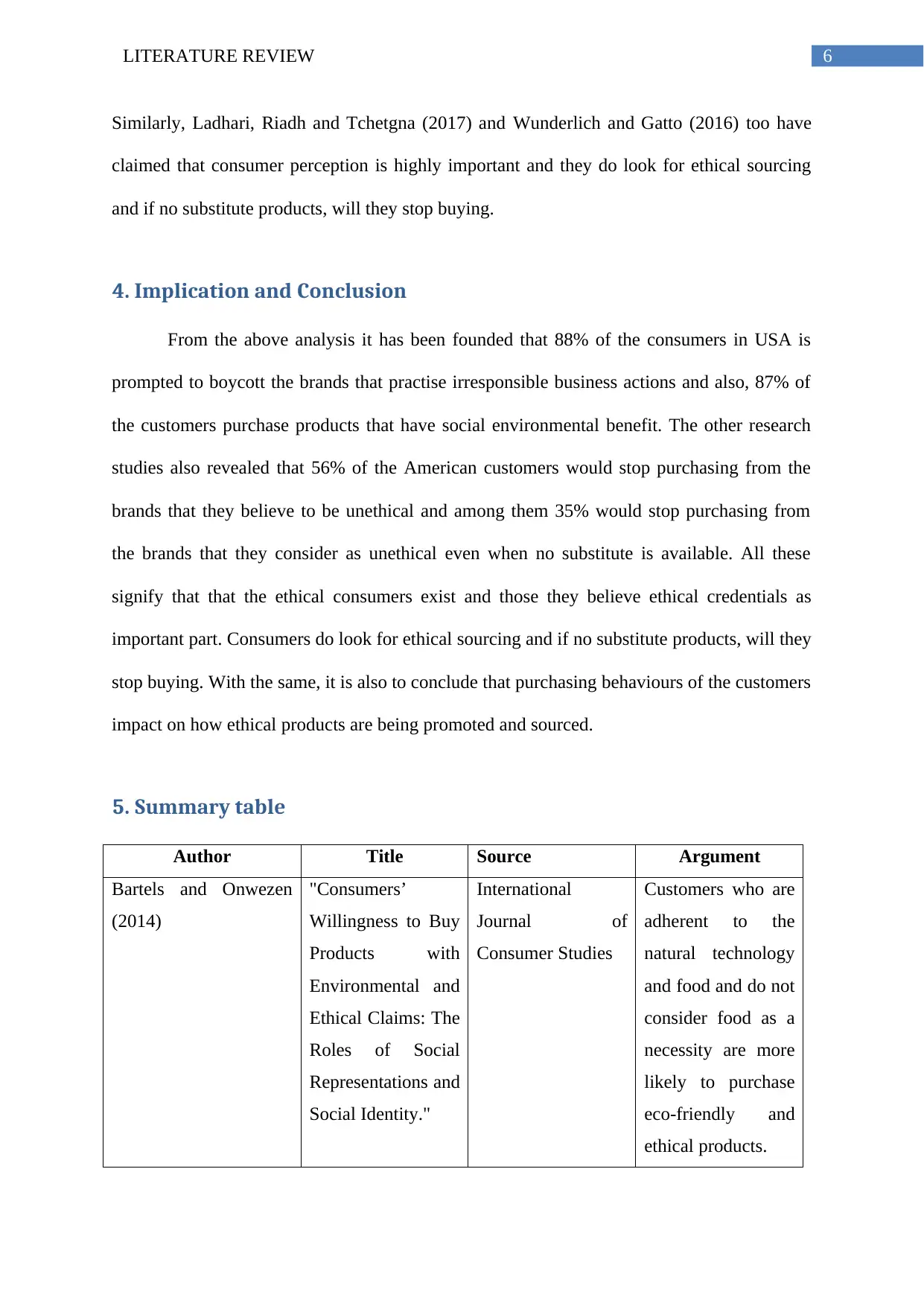
6LITERATURE REVIEW
Similarly, Ladhari, Riadh and Tchetgna (2017) and Wunderlich and Gatto (2016) too have
claimed that consumer perception is highly important and they do look for ethical sourcing
and if no substitute products, will they stop buying.
4. Implication and Conclusion
From the above analysis it has been founded that 88% of the consumers in USA is
prompted to boycott the brands that practise irresponsible business actions and also, 87% of
the customers purchase products that have social environmental benefit. The other research
studies also revealed that 56% of the American customers would stop purchasing from the
brands that they believe to be unethical and among them 35% would stop purchasing from
the brands that they consider as unethical even when no substitute is available. All these
signify that that the ethical consumers exist and those they believe ethical credentials as
important part. Consumers do look for ethical sourcing and if no substitute products, will they
stop buying. With the same, it is also to conclude that purchasing behaviours of the customers
impact on how ethical products are being promoted and sourced.
5. Summary table
Author Title Source Argument
Bartels and Onwezen
(2014)
"Consumers’
Willingness to Buy
Products with
Environmental and
Ethical Claims: The
Roles of Social
Representations and
Social Identity."
International
Journal of
Consumer Studies
Customers who are
adherent to the
natural technology
and food and do not
consider food as a
necessity are more
likely to purchase
eco-friendly and
ethical products.
Similarly, Ladhari, Riadh and Tchetgna (2017) and Wunderlich and Gatto (2016) too have
claimed that consumer perception is highly important and they do look for ethical sourcing
and if no substitute products, will they stop buying.
4. Implication and Conclusion
From the above analysis it has been founded that 88% of the consumers in USA is
prompted to boycott the brands that practise irresponsible business actions and also, 87% of
the customers purchase products that have social environmental benefit. The other research
studies also revealed that 56% of the American customers would stop purchasing from the
brands that they believe to be unethical and among them 35% would stop purchasing from
the brands that they consider as unethical even when no substitute is available. All these
signify that that the ethical consumers exist and those they believe ethical credentials as
important part. Consumers do look for ethical sourcing and if no substitute products, will they
stop buying. With the same, it is also to conclude that purchasing behaviours of the customers
impact on how ethical products are being promoted and sourced.
5. Summary table
Author Title Source Argument
Bartels and Onwezen
(2014)
"Consumers’
Willingness to Buy
Products with
Environmental and
Ethical Claims: The
Roles of Social
Representations and
Social Identity."
International
Journal of
Consumer Studies
Customers who are
adherent to the
natural technology
and food and do not
consider food as a
necessity are more
likely to purchase
eco-friendly and
ethical products.
Paraphrase This Document
Need a fresh take? Get an instant paraphrase of this document with our AI Paraphraser
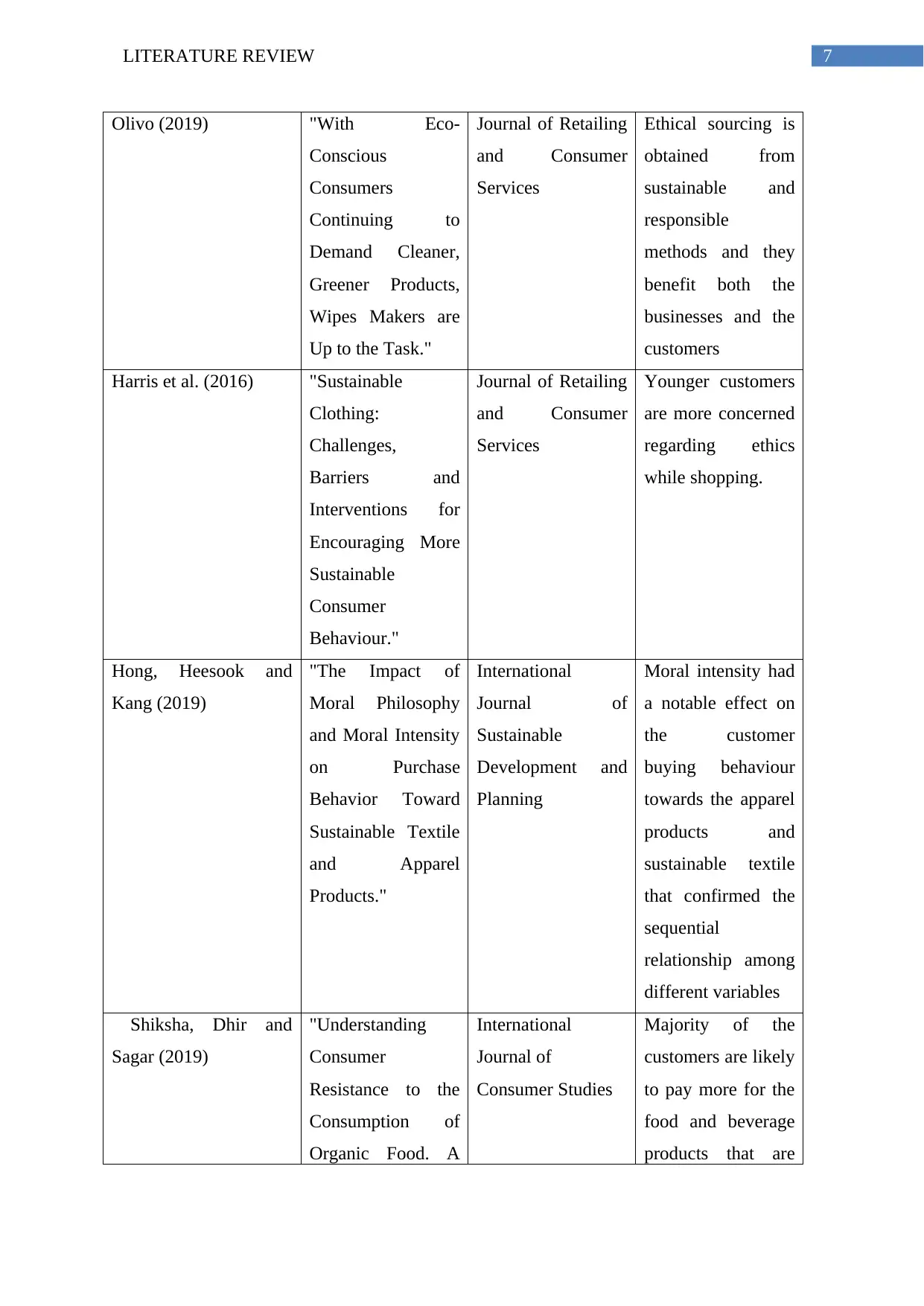
7LITERATURE REVIEW
Olivo (2019) "With Eco-
Conscious
Consumers
Continuing to
Demand Cleaner,
Greener Products,
Wipes Makers are
Up to the Task."
Journal of Retailing
and Consumer
Services
Ethical sourcing is
obtained from
sustainable and
responsible
methods and they
benefit both the
businesses and the
customers
Harris et al. (2016) "Sustainable
Clothing:
Challenges,
Barriers and
Interventions for
Encouraging More
Sustainable
Consumer
Behaviour."
Journal of Retailing
and Consumer
Services
Younger customers
are more concerned
regarding ethics
while shopping.
Hong, Heesook and
Kang (2019)
"The Impact of
Moral Philosophy
and Moral Intensity
on Purchase
Behavior Toward
Sustainable Textile
and Apparel
Products."
International
Journal of
Sustainable
Development and
Planning
Moral intensity had
a notable effect on
the customer
buying behaviour
towards the apparel
products and
sustainable textile
that confirmed the
sequential
relationship among
different variables
Shiksha, Dhir and
Sagar (2019)
"Understanding
Consumer
Resistance to the
Consumption of
Organic Food. A
International
Journal of
Consumer Studies
Majority of the
customers are likely
to pay more for the
food and beverage
products that are
Olivo (2019) "With Eco-
Conscious
Consumers
Continuing to
Demand Cleaner,
Greener Products,
Wipes Makers are
Up to the Task."
Journal of Retailing
and Consumer
Services
Ethical sourcing is
obtained from
sustainable and
responsible
methods and they
benefit both the
businesses and the
customers
Harris et al. (2016) "Sustainable
Clothing:
Challenges,
Barriers and
Interventions for
Encouraging More
Sustainable
Consumer
Behaviour."
Journal of Retailing
and Consumer
Services
Younger customers
are more concerned
regarding ethics
while shopping.
Hong, Heesook and
Kang (2019)
"The Impact of
Moral Philosophy
and Moral Intensity
on Purchase
Behavior Toward
Sustainable Textile
and Apparel
Products."
International
Journal of
Sustainable
Development and
Planning
Moral intensity had
a notable effect on
the customer
buying behaviour
towards the apparel
products and
sustainable textile
that confirmed the
sequential
relationship among
different variables
Shiksha, Dhir and
Sagar (2019)
"Understanding
Consumer
Resistance to the
Consumption of
Organic Food. A
International
Journal of
Consumer Studies
Majority of the
customers are likely
to pay more for the
food and beverage
products that are
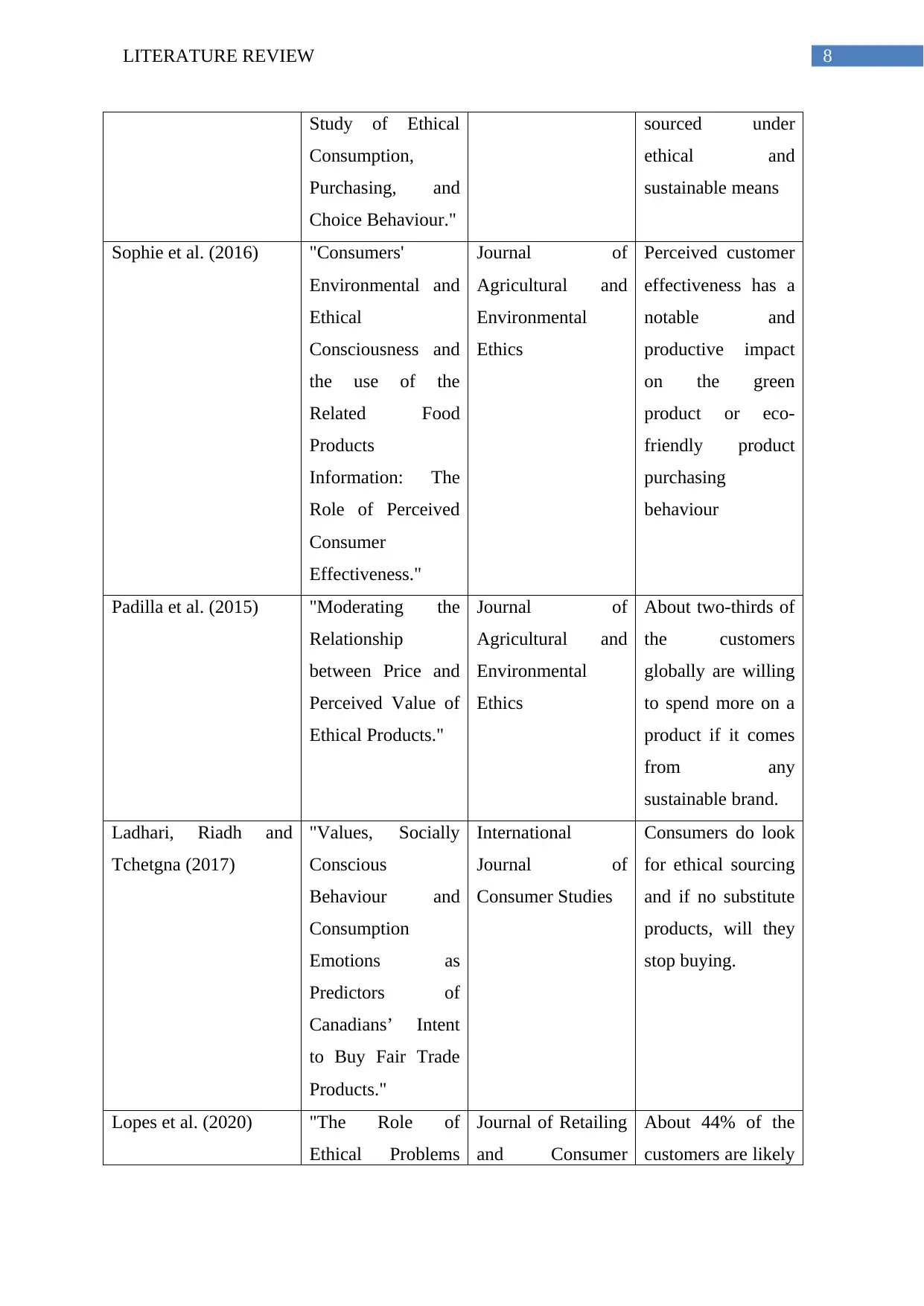
8LITERATURE REVIEW
Study of Ethical
Consumption,
Purchasing, and
Choice Behaviour."
sourced under
ethical and
sustainable means
Sophie et al. (2016) "Consumers'
Environmental and
Ethical
Consciousness and
the use of the
Related Food
Products
Information: The
Role of Perceived
Consumer
Effectiveness."
Journal of
Agricultural and
Environmental
Ethics
Perceived customer
effectiveness has a
notable and
productive impact
on the green
product or eco-
friendly product
purchasing
behaviour
Padilla et al. (2015) "Moderating the
Relationship
between Price and
Perceived Value of
Ethical Products."
Journal of
Agricultural and
Environmental
Ethics
About two-thirds of
the customers
globally are willing
to spend more on a
product if it comes
from any
sustainable brand.
Ladhari, Riadh and
Tchetgna (2017)
"Values, Socially
Conscious
Behaviour and
Consumption
Emotions as
Predictors of
Canadians’ Intent
to Buy Fair Trade
Products."
International
Journal of
Consumer Studies
Consumers do look
for ethical sourcing
and if no substitute
products, will they
stop buying.
Lopes et al. (2020) "The Role of
Ethical Problems
Journal of Retailing
and Consumer
About 44% of the
customers are likely
Study of Ethical
Consumption,
Purchasing, and
Choice Behaviour."
sourced under
ethical and
sustainable means
Sophie et al. (2016) "Consumers'
Environmental and
Ethical
Consciousness and
the use of the
Related Food
Products
Information: The
Role of Perceived
Consumer
Effectiveness."
Journal of
Agricultural and
Environmental
Ethics
Perceived customer
effectiveness has a
notable and
productive impact
on the green
product or eco-
friendly product
purchasing
behaviour
Padilla et al. (2015) "Moderating the
Relationship
between Price and
Perceived Value of
Ethical Products."
Journal of
Agricultural and
Environmental
Ethics
About two-thirds of
the customers
globally are willing
to spend more on a
product if it comes
from any
sustainable brand.
Ladhari, Riadh and
Tchetgna (2017)
"Values, Socially
Conscious
Behaviour and
Consumption
Emotions as
Predictors of
Canadians’ Intent
to Buy Fair Trade
Products."
International
Journal of
Consumer Studies
Consumers do look
for ethical sourcing
and if no substitute
products, will they
stop buying.
Lopes et al. (2020) "The Role of
Ethical Problems
Journal of Retailing
and Consumer
About 44% of the
customers are likely
⊘ This is a preview!⊘
Do you want full access?
Subscribe today to unlock all pages.

Trusted by 1+ million students worldwide
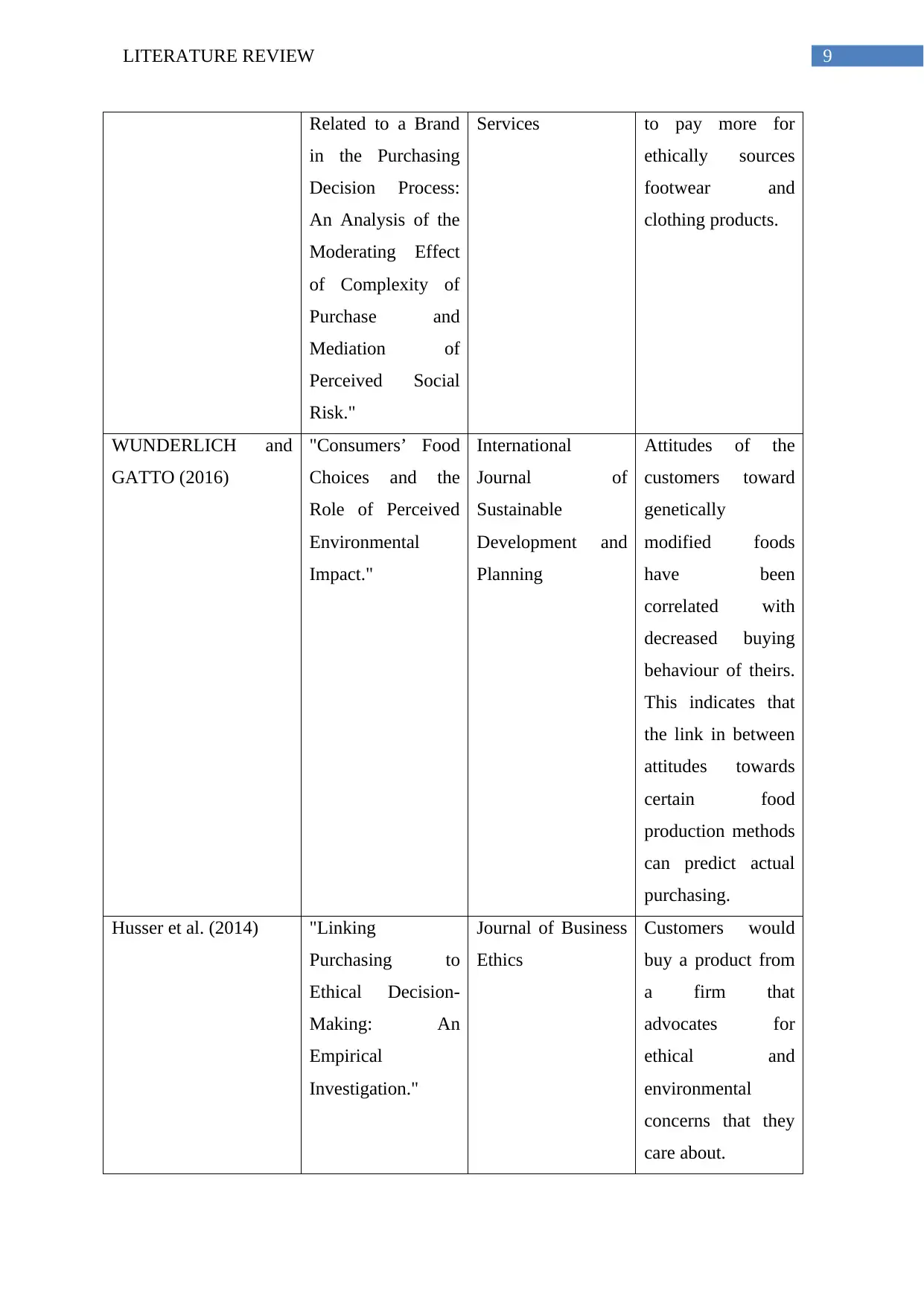
9LITERATURE REVIEW
Related to a Brand
in the Purchasing
Decision Process:
An Analysis of the
Moderating Effect
of Complexity of
Purchase and
Mediation of
Perceived Social
Risk."
Services to pay more for
ethically sources
footwear and
clothing products.
WUNDERLICH and
GATTO (2016)
"Consumers’ Food
Choices and the
Role of Perceived
Environmental
Impact."
International
Journal of
Sustainable
Development and
Planning
Attitudes of the
customers toward
genetically
modified foods
have been
correlated with
decreased buying
behaviour of theirs.
This indicates that
the link in between
attitudes towards
certain food
production methods
can predict actual
purchasing.
Husser et al. (2014) "Linking
Purchasing to
Ethical Decision-
Making: An
Empirical
Investigation."
Journal of Business
Ethics
Customers would
buy a product from
a firm that
advocates for
ethical and
environmental
concerns that they
care about.
Related to a Brand
in the Purchasing
Decision Process:
An Analysis of the
Moderating Effect
of Complexity of
Purchase and
Mediation of
Perceived Social
Risk."
Services to pay more for
ethically sources
footwear and
clothing products.
WUNDERLICH and
GATTO (2016)
"Consumers’ Food
Choices and the
Role of Perceived
Environmental
Impact."
International
Journal of
Sustainable
Development and
Planning
Attitudes of the
customers toward
genetically
modified foods
have been
correlated with
decreased buying
behaviour of theirs.
This indicates that
the link in between
attitudes towards
certain food
production methods
can predict actual
purchasing.
Husser et al. (2014) "Linking
Purchasing to
Ethical Decision-
Making: An
Empirical
Investigation."
Journal of Business
Ethics
Customers would
buy a product from
a firm that
advocates for
ethical and
environmental
concerns that they
care about.
Paraphrase This Document
Need a fresh take? Get an instant paraphrase of this document with our AI Paraphraser
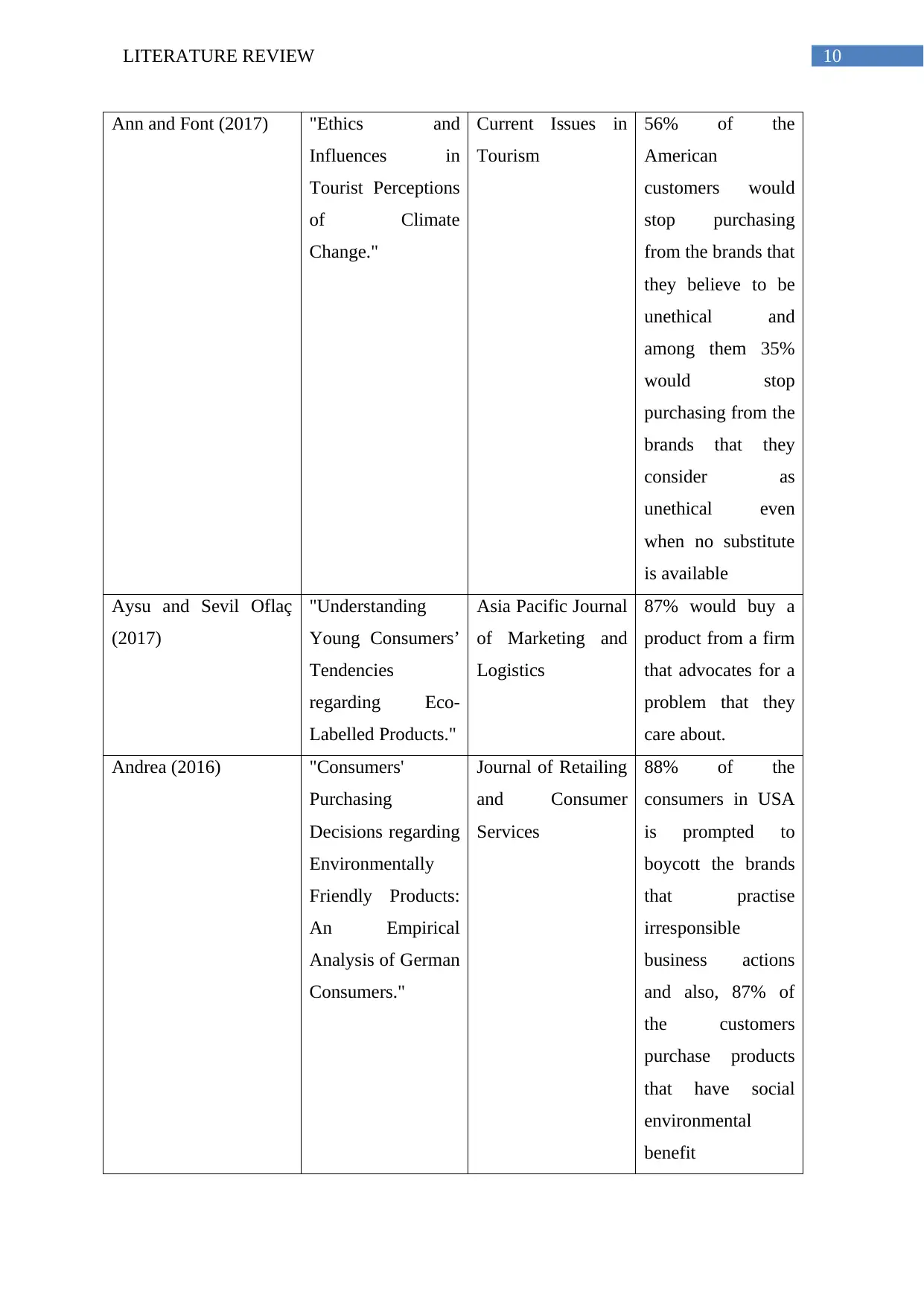
10LITERATURE REVIEW
Ann and Font (2017) "Ethics and
Influences in
Tourist Perceptions
of Climate
Change."
Current Issues in
Tourism
56% of the
American
customers would
stop purchasing
from the brands that
they believe to be
unethical and
among them 35%
would stop
purchasing from the
brands that they
consider as
unethical even
when no substitute
is available
Aysu and Sevil Oflaç
(2017)
"Understanding
Young Consumers’
Tendencies
regarding Eco-
Labelled Products."
Asia Pacific Journal
of Marketing and
Logistics
87% would buy a
product from a firm
that advocates for a
problem that they
care about.
Andrea (2016) "Consumers'
Purchasing
Decisions regarding
Environmentally
Friendly Products:
An Empirical
Analysis of German
Consumers."
Journal of Retailing
and Consumer
Services
88% of the
consumers in USA
is prompted to
boycott the brands
that practise
irresponsible
business actions
and also, 87% of
the customers
purchase products
that have social
environmental
benefit
Ann and Font (2017) "Ethics and
Influences in
Tourist Perceptions
of Climate
Change."
Current Issues in
Tourism
56% of the
American
customers would
stop purchasing
from the brands that
they believe to be
unethical and
among them 35%
would stop
purchasing from the
brands that they
consider as
unethical even
when no substitute
is available
Aysu and Sevil Oflaç
(2017)
"Understanding
Young Consumers’
Tendencies
regarding Eco-
Labelled Products."
Asia Pacific Journal
of Marketing and
Logistics
87% would buy a
product from a firm
that advocates for a
problem that they
care about.
Andrea (2016) "Consumers'
Purchasing
Decisions regarding
Environmentally
Friendly Products:
An Empirical
Analysis of German
Consumers."
Journal of Retailing
and Consumer
Services
88% of the
consumers in USA
is prompted to
boycott the brands
that practise
irresponsible
business actions
and also, 87% of
the customers
purchase products
that have social
environmental
benefit
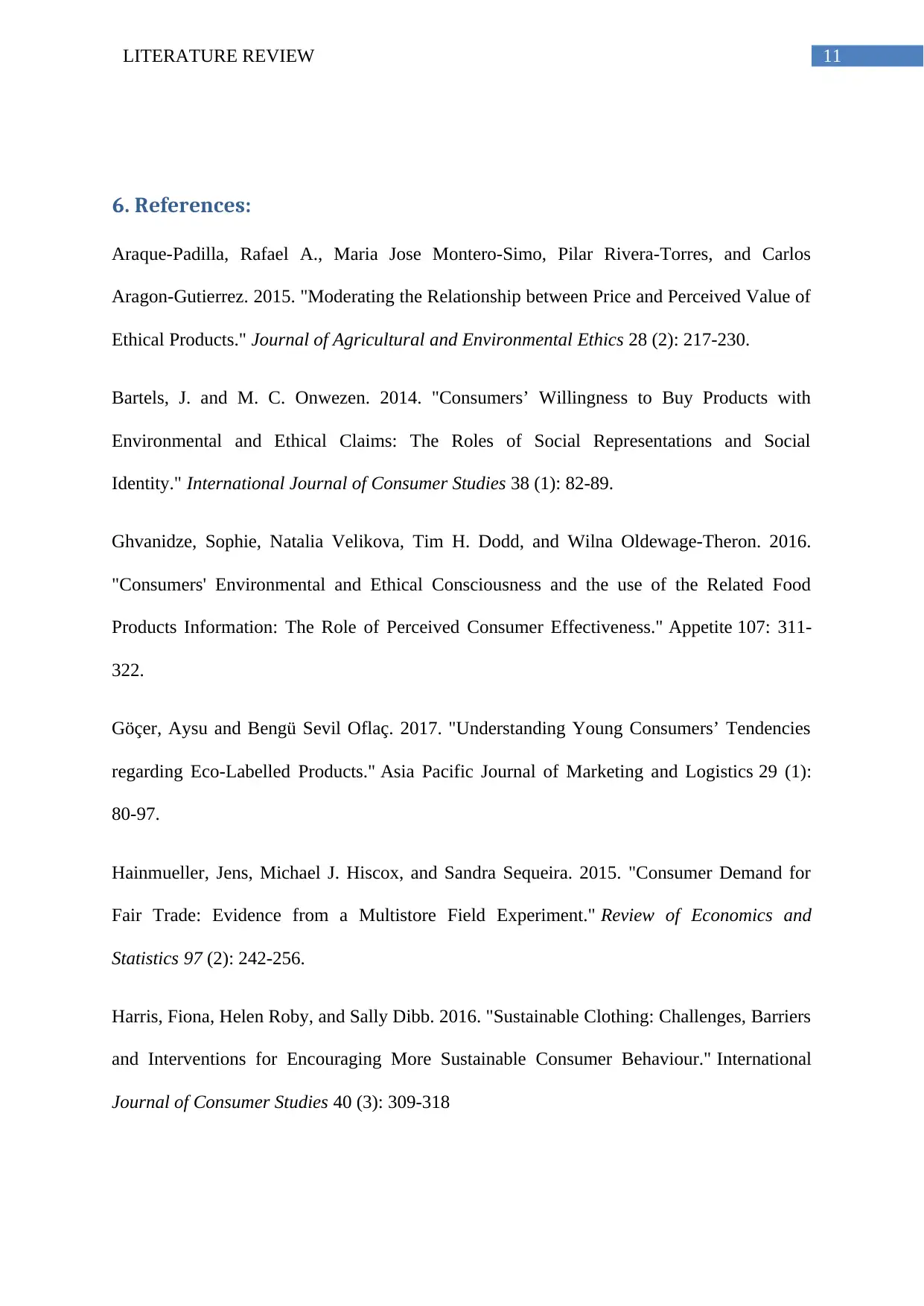
11LITERATURE REVIEW
6. References:
Araque-Padilla, Rafael A., Maria Jose Montero-Simo, Pilar Rivera-Torres, and Carlos
Aragon-Gutierrez. 2015. "Moderating the Relationship between Price and Perceived Value of
Ethical Products." Journal of Agricultural and Environmental Ethics 28 (2): 217-230.
Bartels, J. and M. C. Onwezen. 2014. "Consumers’ Willingness to Buy Products with
Environmental and Ethical Claims: The Roles of Social Representations and Social
Identity." International Journal of Consumer Studies 38 (1): 82-89.
Ghvanidze, Sophie, Natalia Velikova, Tim H. Dodd, and Wilna Oldewage-Theron. 2016.
"Consumers' Environmental and Ethical Consciousness and the use of the Related Food
Products Information: The Role of Perceived Consumer Effectiveness." Appetite 107: 311-
322.
Göçer, Aysu and Bengü Sevil Oflaç. 2017. "Understanding Young Consumers’ Tendencies
regarding Eco-Labelled Products." Asia Pacific Journal of Marketing and Logistics 29 (1):
80-97.
Hainmueller, Jens, Michael J. Hiscox, and Sandra Sequeira. 2015. "Consumer Demand for
Fair Trade: Evidence from a Multistore Field Experiment." Review of Economics and
Statistics 97 (2): 242-256.
Harris, Fiona, Helen Roby, and Sally Dibb. 2016. "Sustainable Clothing: Challenges, Barriers
and Interventions for Encouraging More Sustainable Consumer Behaviour." International
Journal of Consumer Studies 40 (3): 309-318
6. References:
Araque-Padilla, Rafael A., Maria Jose Montero-Simo, Pilar Rivera-Torres, and Carlos
Aragon-Gutierrez. 2015. "Moderating the Relationship between Price and Perceived Value of
Ethical Products." Journal of Agricultural and Environmental Ethics 28 (2): 217-230.
Bartels, J. and M. C. Onwezen. 2014. "Consumers’ Willingness to Buy Products with
Environmental and Ethical Claims: The Roles of Social Representations and Social
Identity." International Journal of Consumer Studies 38 (1): 82-89.
Ghvanidze, Sophie, Natalia Velikova, Tim H. Dodd, and Wilna Oldewage-Theron. 2016.
"Consumers' Environmental and Ethical Consciousness and the use of the Related Food
Products Information: The Role of Perceived Consumer Effectiveness." Appetite 107: 311-
322.
Göçer, Aysu and Bengü Sevil Oflaç. 2017. "Understanding Young Consumers’ Tendencies
regarding Eco-Labelled Products." Asia Pacific Journal of Marketing and Logistics 29 (1):
80-97.
Hainmueller, Jens, Michael J. Hiscox, and Sandra Sequeira. 2015. "Consumer Demand for
Fair Trade: Evidence from a Multistore Field Experiment." Review of Economics and
Statistics 97 (2): 242-256.
Harris, Fiona, Helen Roby, and Sally Dibb. 2016. "Sustainable Clothing: Challenges, Barriers
and Interventions for Encouraging More Sustainable Consumer Behaviour." International
Journal of Consumer Studies 40 (3): 309-318
⊘ This is a preview!⊘
Do you want full access?
Subscribe today to unlock all pages.

Trusted by 1+ million students worldwide
1 out of 14
Related Documents
Your All-in-One AI-Powered Toolkit for Academic Success.
+13062052269
info@desklib.com
Available 24*7 on WhatsApp / Email
![[object Object]](/_next/static/media/star-bottom.7253800d.svg)
Unlock your academic potential
Copyright © 2020–2026 A2Z Services. All Rights Reserved. Developed and managed by ZUCOL.





